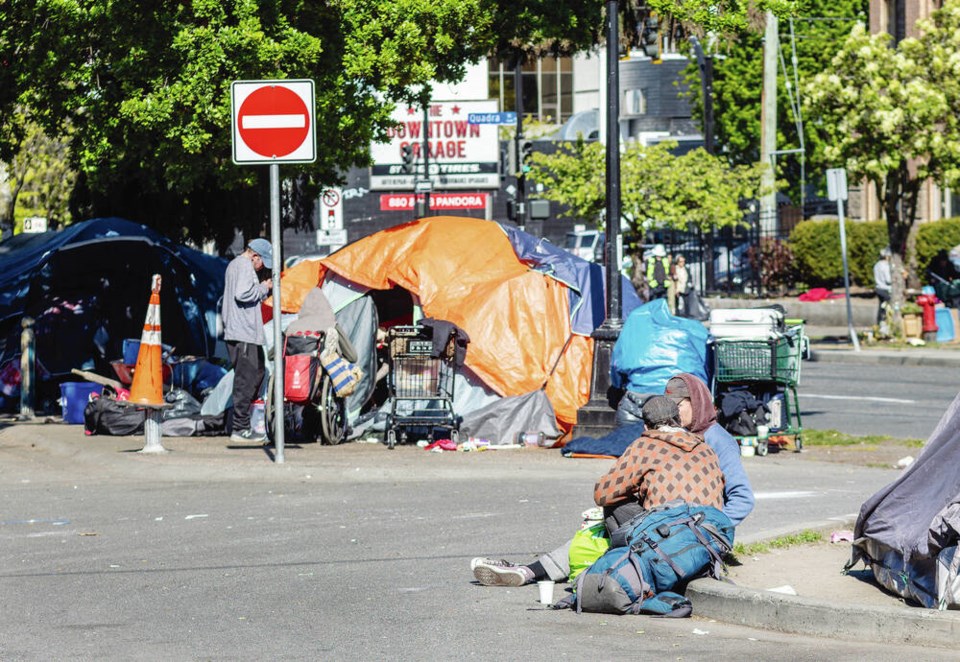Decriminalization only increased negative views of those addicted to hard drugs and didn’t reduce related overdose deaths as intended, says the communications director for Our Place, which provides housing and services to those who are unhoused.
Grant McKenzie said news that consuming illicit drugs — such as fentanyl, heroin and cocaine — will again be banned in public places might make people “a bit more compassionate towards people suffering from drug addiction because the open drug use is really making the public less empathetic to people who are struggling.”
People will still be allowed to possess and use 2.5 grams or less in their homes, shelters or supervised consumption sites, but not in parks, on transit or in hospitals.
“I think having people use in the appropriate spots will be a positive thing for the community,” said McKenzie.
He said the skyrocketing toxic drug overdose death rate — between six and seven people continue to die every day — shows decriminalization of possession of small amounts of illicit drugs “didn’t make a difference.”
To reduce that death rate, recovery and treatment supports should have been in place at the same time as the three-year pilot project, which began in January of last year, he said.
“You have to be able to say this is the pathway to you going into recovery, not a pathway to stay in addiction.”
McKenzie said a large infusion of funding is needed for prevention, recovery and the kind of long-term treatment that has proved to be effective. Our Place’s New Roads Therapeutic Recovery Community program in View Royal offers stays of nine months to two years, “not 30 days,” he said.
“I don’t believe that leaving people in their addiction is compassionate because it doesn’t improve people’s lives — it keeps them alive, but it doesn’t improve their lives,” said McKenzie.
Only recovery will improve their lives, he said.
On the prevention side, McKenzie said if young people came and saw “how these drugs take away so much from a person,” they might never experiment.
“I think we definitely have to be saying to young people that these drugs will kill you and if they don’t kill you they’ll destroy your life first.”
Nanaimo Mayor Leonard Krog, one of the loudest voices calling decriminalization a failed experiment, said Health Canada’s decision to grant the province’s request to once again make it illegal to possess and consume illicit drugs in public places was not a surprise but did come as a relief.
“I can’t speak for absolutely everybody but I would say the citizens of Nanaimo are pleased to see this and support this reversal of a policy that wasn’t working, wasn’t seen to be working, and in my view was never going to work,” said Krog.
The goal of the provincial pilot program was to destigmatize drug use to help reduce overdose deaths, but Krog said: “You can’t de-stigmatize something that people know is bad for their health.
“Nobody wants to see public drunkenness. They don’t want to see public drug abuse.”
Decriminalization has taken a toll on residents and businesses, said Krog, adding he’s hopeful other governments will learn from B.C.’s experiment.
B.C. United mental health and addictions critic Elenore Sturko, a former police officer who has long called the decriminalization pilot a failure, agrees addiction is a health-care issue but said the re-criminalization of public drug use will only put the problem back into the hands of law enforcement rather than guide users to the services they need.
The NDP has been in government for seven of the eight years since the toxic-drug-overdose crisis was declared a public-health emergency, said Sturko. “They’ve had every opportunity to scale up services.”
B.C. Green Party Leader Sonia Furstenau said she would like to see the other opposition parties show “even a sliver of urgency about homelessness and poverty that they reserve for drug use.”
Reversing decriminalization “won’t solve the deep-rooted issues of inequality and disconnectedness in our communities,” Furstenau said in a statement.
Although the province achieved a ban on public drug use via federal drug laws, its attempt to enforce its own legislation — currently the subject of a court challenge — will continue, according to Public Safety Minister and Solicitor General Mike Farnworth.
Corey Ranger of the Harm Reduction Nurses Association, which is leading the court challenge, said in a statement the association is deeply concerned and frustrated by the province’s “improper circumvention” of a B.C. Supreme Court order.
Ranger called the decriminalization reversal a “reckless policy regression” that will lead to irreparable harms, including more deaths.
Recriminalizing people who use drugs “will just make people less safe,” said Ranger.
>>> To comment on this article, write a letter to the editor: [email protected]



